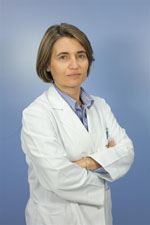"Infant Feeding and Growth Disorders", topic of the Clinic's next videochat
On Thursday, January 12, Dr. Cristina Azcona, a specialist in Pediatric Endocrinology, will attend in real time to the consultations

"Child Feeding and Growth Disorders" will be the focus of the next videochat on topic . Clínica Universidad de Navarra to be broadcast this Thursday, January 12. On this occasion, questions from Internet users will be answered in real time by the pediatrician specializing in Pediatric Endocrinology, Dr. Cristina Azcona San Julián. Queries can already be sent through the space provided at www.cun.es. The videochat will be broadcast live between 11 and 12 o'clock this Thursday at the web address www.cun.es/videochat/septiembre2011/index.html.
. The specialist's answers can be followed in real time through the aforementioned web address. Dr. Azcona will answer a selection of the questions sent by Internet users. Once the broadcast has finished, the Clinic's website will make the video recording of the specialist's answers available to users. In the following days, the written transcription of the audiovisual content will be published on the same web address. In addition, the answers to those questions that could not be answered live due to the limit of the broadcasting time will be published. The online section of videochats has a monthly periodicity, since it is broadcasted, in schedule from 11 am to 12 pm, every second Thursday of each month.
The importance of a correct diet
reference letter In the preschool stage, children have already acquired the basis of their habits in terms of social and environmental factors, being influenced by the habits and customs of the culture that surrounds them. It is, therefore, a particularly important stage for the child to learn to develop healthy eating habits.
In the school period the child should continue to maintain these habits and reinforce them. At this stage the child begins to be more regular in terms of the amount of food eaten, and there is no longer as much variability in energy intake as in preschool children. It is very important to maintain a regularity in the meals, trying to eat with the parents, if possible, or in the high school with the rest of the classmates. Try to maintain the rhythm of at least four, and better if there are five, regular meals: breakfast, average morning (according to the schedule of the meals), lunch, snack and dinner.
More information on infant feeding
Growth disorders
Growth is a complex phenomenon during which body mass increases and the various organs reach morphological maturity and full functional capacity.
Somatic growth is the result a complex interaction between various genetic, nutritional, environmental, psychosocial and hormonal factors (growth hormone, thyroid hormones, glucocorticoids and sex hormones).
There are numerous causes that can lead to a disturbance in a child's growth and thus affect his or her height. To distinguish the main causes it is essential to differentiate whether the child presents a proportionate or disproportionate growth, and also to assess whether its origin is prenatal or postnatal.
Among the main causes of disproportionate height leave are bone dysplasias and metabolic diseases.
More information on growth disorders.
Highlights of the curriculum by Dr. Cristina Azcona San Julián
